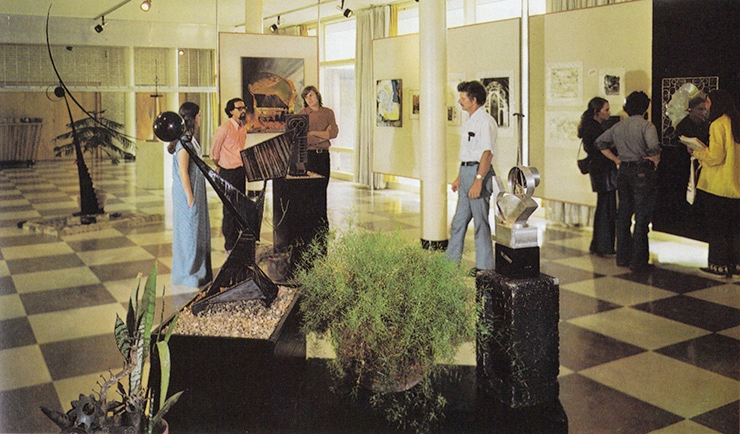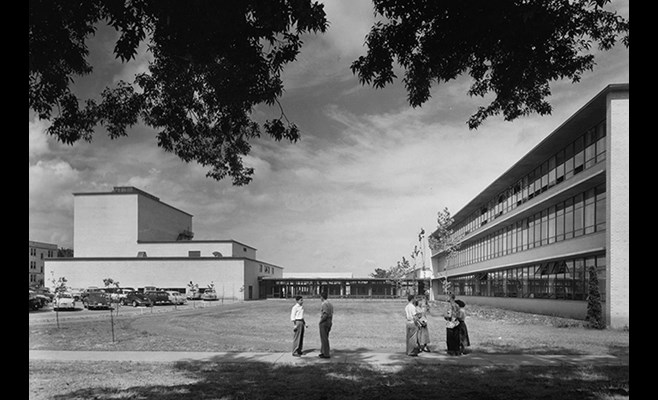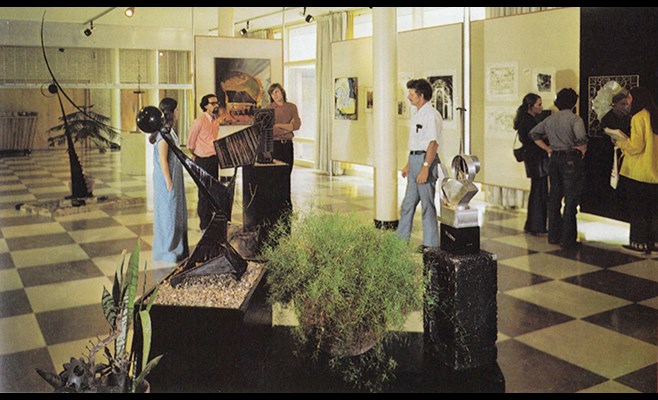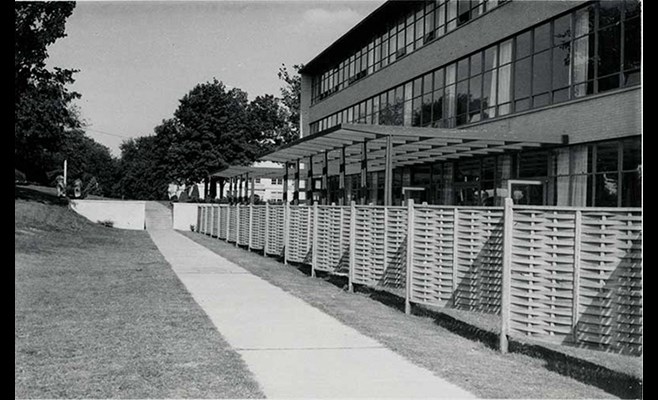
The U of A Board of Trustees has approved the hiring of the architecture firms Deborah Berke Partners (DBP), based in New York, and Miller Boskus Lack (MBL) of Fayetteville, to work with the U of A and its Fulbright College of Arts and Sciences to restore the campus’s Fine Arts Center.
DBP is renowned for transforming old buildings for new futures and for their innovative approaches to arts buildings on campuses. The firm has successfully breathed new life into buildings by renowned architects of the past, including HH Richardson, McKim, Mead & White, Albert Kahn and Louis Kahn.
On campuses, DBP is currently engaged in projects at Princeton, Harvard Law School, the University of Pennsylvania, Brown University and the University of Virginia. Additionally, MBL has previously worked with the U of A on the Champions Hall, Mullins Library, Library Storage and Starbucks at Brough Commons projects.
“The historic significance, beauty and impact of our beloved Fine Arts Center cannot be overstated, and selecting a team that would be able to preserve Edward Durell Stone’s vision while restoring the center properly was no easy task,” said U of A Chancellor Joe Steinmetz. “But in DBP and MBL, we have found a phenomenal design team that has the knowledge and skills needed for this project.”
Steinmetz said that Deborah Berke is also dean of the Yale School of Architecture, adding that “both she and DBP have a unique and needed perspective on restoring and creating campus spaces that have both high function and beauty of form.”
The design and construction team will start by conducting a programming and scope exercise to validate all elements of the project before moving on to schematic design. Grant funding will pay for much of the renovation, which currently has a total project cost estimated at $38 million.
DBP and MBL will work with a U of A building committee: Con-Real Construction as the project’s construction manager; Wiss, Janney, Elstner Associates as a historic preservation consultant; civil engineers Development Consultants Inc.; HSA Engineering as mechanical, electrical, plumbing and fire protection engineers; structural engineers Martin/Martin; and landscape architects Ground Control to ensure campus master planning, preservation, design and sustainability principles are followed throughout the project.
Additionally, theatre designer Charcoalblue will join the group to help preserve the University Theatre space in the Fine Arts Center while incorporating the latest acoustic and audio/visual components.
Construction is tentatively scheduled to begin in early 2022 and to finish around fall 2023. The construction will be completed in phases that are currently being determined.
“We are delighted to be working with the University of Arkansas to transform the Fine Arts Center for the 21st century,” said Deborah Berke, a partner at DBP. “Edward Durell Stone’s building is an important early example of International Style Modernism in the U.S. The university has been an excellent steward of this well-used, and well-loved, hub of creativity and learning, and we look forward to revitalizing and adapting it to meet the needs of the present and the future.”
The Fine Arts Center is situated near the center of campus, between the Central Quad and the Chi Omega Greek Theatre and is listed on the National Register of Historic Places.
When it was built in 1951, it was the first multidisciplinary academic arts building in the country — bringing together fine and applied arts, architecture, dance, music, sculpture, painting and drama into a single home, emphasizing the belief in their innate connection.
“The Fine Arts Center was visionary and ahead of its time in combining multidisciplinary arts in one facility in 1951,” said Noah Biklen, partner at DBP and partner-in-charge on the project. “In our work, we explore how to make buildings and spaces more visible and accessible to wider publics. What is exciting about the promise of this project is the opportunity to restore and transform the building for today’s needs in the spirit of the original idea of the Fine Arts Center as a hub of creativity and collaboration.”
“Since the 1950s, the University of Arkansas and Northwest Arkansas have grown to be a nationally recognized center for the arts,” Biklen added. “We are thrilled to work with the university to connect this growing community of arts, both on campus and off, back to a restored and transformed Fine Arts Center — we envision it as a renewed creative crossroads on campus and beyond.”
Biklen said the restoration project will include the exterior and the interior of the Fine Arts Center building, as well as some site elements. The interior will also be sensitively renovated to better support the departments’ program requirements.
“We are very excited to begin this much-needed project to restore one of our campus’ most loved, used and historic places,” said Todd Shields, dean of Fulbright College.
The college’s Department of Music, Department of Theatre and School of Art all call portions of the Fine Arts Center home.
Shields said the renovation of the space is important because it will “preserve our past, while helping us continue to evolve and provide the latest educational amenities which will further enhance the outstanding fine arts education we provide.”
Jeannie Hulen, Fulbright College’s associate dean of fine arts, agreed, adding that reestablishing the center’s lobby, which was subdivided some years ago to create a secure exhibition space, will be key to this vision. The lobby will be reopened and restored to its role as a pre-event space for the Stella Boyle Smith Concert Hall and the University Theatre.
“This restoration will return the center’s floor-to-ceiling glass windows that Edward Durell Stone is famous for,” Hulen said. “By opening up the lobby space, we can better welcome the community into this space and create more of the intentional, collaborative connections that the center’s original designers envisioned.”
For more information about this project, or for general campus planning and standards information, visit planning.uark.edu.
About the Fine Arts Center: In addition to being the first multidisciplinary academic arts building in the country, the University of Arkansas’ Fine Arts Center was also the first Modernist academic building on the university campus and was designed by well-known New York architect Edward Durell Stone. Stone grew up in Fayetteville, and his family’s strong ties to the region and other prominent local families like the Fulbrights led him to a series of projects on campus which include Sigma Nu, the Fine Arts Center and the former Carlson Terrace. Stone enlisted his colleague at the Yale University School of Architecture, Christopher Tunnard, to design the center’s landscape, which was conceived as integral to the design and function of the building. The building was arranged as a series of blocks connected by a glassy lobby that allowed views between the various outdoor spaces. The building and the landscape together form a characteristic expression of the International Style, and both are now listed on the National Register of Historic Places.
About the University of Arkansas: As Arkansas' flagship institution, the U of A provides an internationally competitive education in more than 200 academic programs. Founded in 1871, the U of A contributes more than $2.2 billion to Arkansas’ economy through the teaching of new knowledge and skills, entrepreneurship and job development, discovery through research and creative activity while also providing training for professional disciplines. The Carnegie Foundation classifies the U of A among the top 3% of U.S. colleges and universities with the highest level of research activity. U.S. News & World Report ranks the U of A among the top public universities in the nation. See how the U of A works to build a better world at Arkansas Research News.
Topics
Contacts
John F. Thomas, manager of university communications
University Relations
479-575-7430, jfthomas@uark.edu
Andra Parrish Liwag, development writer
Fulbright College of Arts and Sciences
479-575-4393,
liwag@uark.edu


